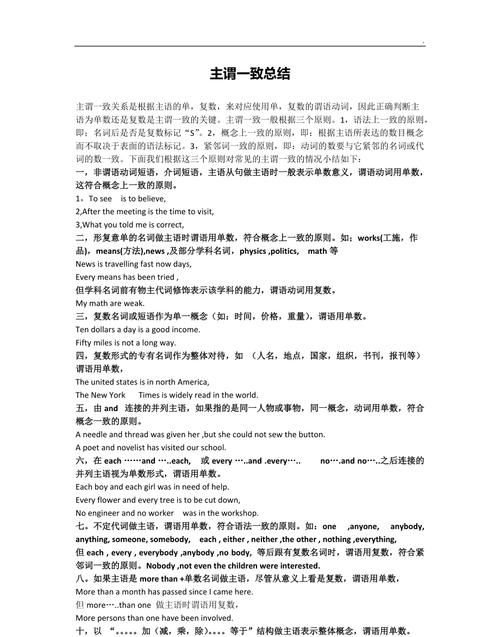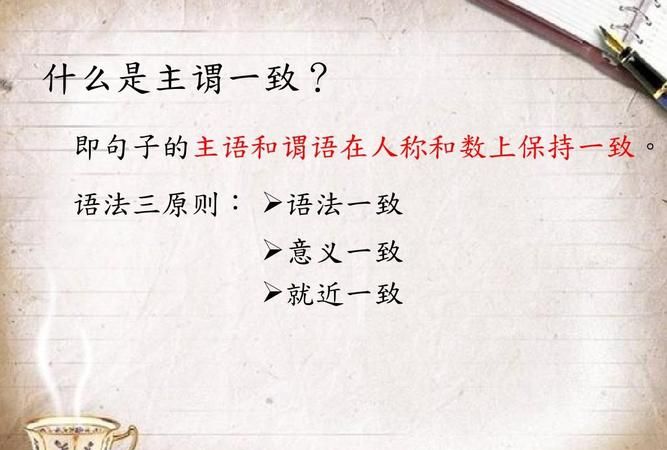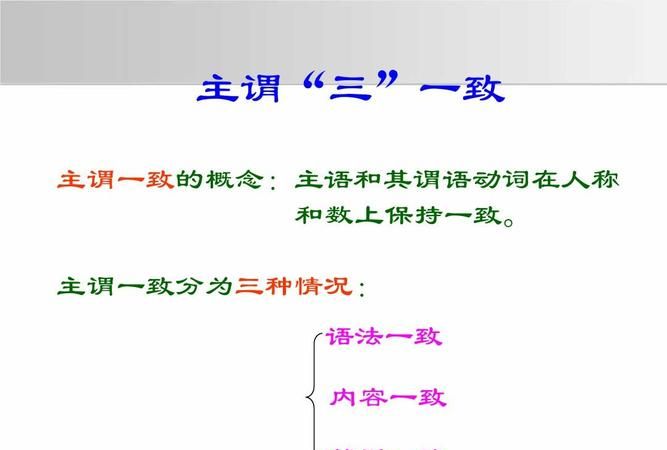本文目录
主谓一致法是什么意思
用作主语的名词词组中心词和谓语动词在单、复数形式上的一致,就是语法一致.也就是说,如果名词中心词是单数,动词用单数形式;如果名词中心词是复数,动词用复数形式.例如:
This table is a genuine antique.
Both parties have their own advantages.
Her job has something to do with computers.
She wants to go home.
They are divorcing each other.
Mary was watching herself in the mirror.
The bird built a nest.
Susan comes home every week-end.
(二) 编辑本段 回目录 主谓一致 - 意义一致原则
有时,主语和谓语动词的一致关系取决于主语的单、复数意义,而不是语法上的单、复数形式,这样的一致关系就是意义一致.例如:
Democratic government gradually take the place of an all-powerful monarchy.
A barracks was attacked by the guerilla.
Mumps is a kind of infectious disease.
The United States is a developed country.
It is the remains of a ruined palace.
The archives was lost.
This pair of trousers costs fifty dollars.
(三) 编辑本段 回目录 主谓一致 - 就近原则
有时,谓语动词的单、复数形式决定于最靠近它的词语.
例如:
Either my grandsons or their father is coming.
No one except his daughters agree with him.
Mary and her sisters are baking a cake.
Neither Richard nor I am going.
编辑本段 回目录 主谓一致 - 以集合名词做主语的主谓一致问题
有些集合名词,ommittee,council,crew,crowd,family,gang,government,group,mob,staff,team, union等,在意义上是复数,但在语法形式上是单数,这类名词作主语的主谓一致问题往往遵循“语法一致”或“意义一致”原则.例如:
The committee has/have decided to dismiss him.
A council of elders governs the tribe.
The present government is trying to control inflation.
The school staff are expected to supervise school meals.
(一)通常作复数的集体名词
包括police,people, cattle, militia, vermin等,这些集体名词通常用作复数.
例如:
The British police have only very limited powers.
The militia were called out to guard the borderland.
It seems the cattle on the sides of the dikes were the only living creatures in these desolate surroundings.
(二)通常作不可数名词的集体名词
通常作不可数名词的集体名词,包括poultry,foliage,machinery, equipment,furniture,
merchandise等,这类名词后的动词用单数形式.
例如:
Poultry is expensive at this time of year.
That green foliage was restful.
The merchandise has arrived undamaged.
All the machinery in the factory is made in China.
The suite of furniture he bought was of contemporary style.
The equipment of the photographic studio was expensive.
(三)可作单数也可作复数的集体名词
可作单数也可作复数的集体名词,包括audience, committee, crew, family, government,jury等.
例如:
The audience was/were enthusiastic on the opening night of the play.
The committee has/have decided to dismiss him.
The jury is/are about to announce the winners.
The government has/have discussed the matter for a long time.
三、a committee, etc of +复数名词的主谓一致问题
如果主语是由a committee of /a panel of /a (the) board of +复数名词构成,随后的动词通常用单数.
例如:
A committee of twelve men is to discuss the matter.
A panel of experts has considered the situation.
The board of managers is responsible for the firm.
四、以-s结尾的名词作主语的主谓一致问题
英语可数名词的规则复数形式是在词尾加-s或-es,但是有一些以-s结尾的名词并不是可数名词.它们用法多样,造成了实际使用上的困难,以下详述了以-s结尾的名词作主语的主谓一致问题.
(一)以-s结尾的疾病名称作主语的主谓一致问题
(二)以-s结尾的游戏名称作主语的主谓一致问题
(三)以-s结尾的地理名称作主语的主谓一致问题
(四)以-ics结尾的学科名称作主语的主谓一致问题
(五)其它以-s结尾的名词的主谓一致问题
(一)以-s结尾的疾病名称作主语的主谓一致问题
以-s结尾的疾病名称作主语的主谓一致问题,如:arthritis,bronchitis,diabetes,mumps,phlebitis,rickets,这类以-s结尾的疾病名称作主语时,谓语动词通常用作单数.
例如:
Arthritis causes great pain in the joints of the patient.
The diabetes is a kind of chronic disease.
Measles usually occurs in children.
Phlebitis is a swollen condition of the blood vessels.
(二)以-s结尾的游戏名称作主语的主谓一致问题
以-s结尾的游戏名称作主语时,谓语动词通常用作单数.
例如:
Darts is basically a easy game.
Marbles is not confined to children.
Skittles is not fashionable nowadays.
Draughts is not very difficult to learn.
但当Darts,Marbles等的意义为游戏器具而非游戏名称时,谓语动词通常用作复数.
例如:
Three darts are thrown at each turn.
All nine skittles were brought down by the good throw.
(三)以-s结尾的地理名称作主语的主谓一致问题
某些以-s结尾的地理名称,如果是国名,如the United States,the Netherlands等,因其是单一政治实体,所以谓语动词用作单数.
例如:
The United States was hit by the Great Depression in 1930s'.
In early January 1996 the Netherlands was hit by its worst storm since 1976.
但如果是群岛、山脉、海峡、瀑布等地理名称作主语,谓语动词用作复数.
例如:
The West Indies are commonly divided into two parts.
The Himalayas have a magnificent variety of plant.
The Straits of Gibraltar have not lost their strategic importance.
The Niagara Falls are perhaps the most splendid waterfall in the world.
(四)以-ics结尾的学科名称作主语的主谓一致问题
某些以-ics结尾的学科名称作主语时,如physics,mathematics,mechanics, optics, acoustics, politics statistics, economics, linguistics, athletics等, 谓语动词通常用作单数.
例如:
Physics is a fundamental subject in science.
The third world economics is promising.
Acoustics studies the science of sound.
Mathematics is an interesting subject.
Athletics is a required course for students of all grades.
但如果这类名词表示学科以外的其它含义,可作复数用.
例如:
Athletics have been greatly encouraged at this college.
The acoustics of the new concert hall are perfect.
The economics of the project are still at issue.
(五)其它以-s结尾的名词的主谓一致问题
A.以-s结尾的由两部分组成的物体名称作主语
英语中有一些通常以-s结尾的由两部分组成的物体名词,如glasses, pincers,pliers,scissors, shorts,suspenders,trousers等,这类名词做主语,如果不带“一把”、“一副”等单位词,谓语动词通常用复数.
例如:
Mary's glasses are new.
John's trousers are black.
如果带有单位词, 则由单位词决定动词的单、复数形式.
例如:
One pair of pincers isn't enough.
Two pairs of scissors are missing from my tool box.
B.其他以-s结尾的名词
英语中还有一些以- s结尾的名词,如archives,arms,clothes, contents, eaves, fireworks, goods, minutes, morals, remains stairs, suburbs, thanks,wages这类名词作主语时,谓语动词通常用复数.
例如:
The archives of the country are kept in the Department of Security.
The contents of the book are most amusing.
High wages often result in high prices.
My thanks are sincere.
五、如果句子的主语是并列结构,其主谓一致问题通常遵循以下原则:
(一)由and/both...and连接的并列主语的主谓一致问题
(二)由or/nor/either...or连接的并列主语的主谓一致问题
(三)主语 + as much as,etc的主谓一致问题
(一)由and/both...and连接的并列主语的主谓一致问题
由and/both...and连接的并列结构作主语,可根据主语的意义决定谓语动词的单、复数形式.
例如:
Pancakes and syrup is a tasty breakfast.
The number and diversity of British newspaper is considerable.
Good and bad taste are inculcated by example.
Fish and chips are getting very expensive.
A truck and a car were in the ditch.
Both Cathy and her daughter Lida have gone fishing in Canada.
当and连接的并列名词词组带有each,every,或者many a 等限定词时,谓语动词通常用单数.
例如:
Each man and each woman there is asked to help.
Every flower and every bush is to be cut down.
Every change of season, every change of weather, indeed every hour of the day, produces some change in the magical hues and shapes of these mountains.
Many a boy was disappointed after seeing the film.
(二)由or/nor/either...or连接的并列主语的主谓一致问题
由or,nor,either...or, neither...nor,not only...but also连接的并列结构作主语,随后的动词形式通常按照“就近原则”处理.
例如:
Neither Lucy nor Carol has any money left.
Neither sleet nor snow stops him from driving his new Mercedes-Benz.
Either Tina or Carol is sure to know the answer.
Neither my father nor my brothers are likely to be at theater.
Neither the Kansas coach nor the players were confident of victory.
Not only one, but all of us are hoping to be there.
Not only the switches but also the old wiring has been stolen.
(三)主语 + as much as,etc的主谓一致问题
当主语后面跟有由as much as, rather than , more than, no less than 等引导的从属结构,或跟有由as well as, in addition to ,with, along with, together with, except等引导的词组时, 其后的动词形式取决主语的形式.
例如:
The vessel, with its entire crew and cargo was lost.
The ocean, as well as the gulf and the bay, provides good fishing.
John, rather than his roommates, is to blame.
Hugh,as well as his two sisters, is vacationing in Wyoming this summer.
Some of the employees as much as the manager were responsible for the failure.
My husband,more than anyone else in the family, is longing to go there again.
Billy, together with his sisters, was wounded in the accident.
No one except two girls was late for school.
六、以表示数量概念的名词词组作主语的主谓一致问题
数量概念分两类:一类是确定数量,如 two years, five seconds,three kilos,等,另一类是非确定数量,如all of..., some of..., none of.如果用这类表示数量概念的名词词组作主语,会产生主谓一致问题.
(一)以表示确定数量的名词词组作主语的主谓一致问题
(二)以表示非确定数量的名词词组作主语的主谓一致问题
(一)以表示确定数量的名词词组作主语
当主语为表示确定数量的名词词组时,如果数量概念被看做一个整体,动词用单数,如果被看做组成该数量的个体,动词用复数.
例如:
The treasurer considered that twenty dollars was not too much to ask.
"Two months is too short a time," General manager warned, "we must hurry up."
Three weeks is needed to complete the task.
There were six silver dollars in each of the stockings.
Three pints is not enough to get him drunk.
A total of 50,000 new bicycles was registered in the year.
如果作主语的名词词组是由“分数/百分数+ of”词组构成,其动词形式 取决于of词组中名词的类别.
例如:
Two-thirds of the people present is against the plan.
Three-fourths of the surface of the earth is covered by sea.
Over twenty percent of the city was destroyed in the war.
Forty-five percent of the doctors were woman.
两数相减或相除,谓语动词用单数;两数相加或相乘,谓语动词可用单数,也可用复数.
例如:
Sixty minus seventeen leaves forty-three.
Forty-two divided by six is seven.
Six and eight makes/make fourteen.
Six times eight is/are forty-eight.
如果主语由"one in/one out of + 复数名词" 构成,在正式语体中,动词用单数.
例如:
One in ten students has passed the examination.
One out of twelve bottles was left intact.
(二)以表示非确定数量的名词词组作主语的主谓一致问题
如果主语由 "a portion of, a series of, a pile of, a panel of +名词"或由“a kind/sort/type of, this kind/sort/type of+名词” 构成,谓语动词通常用单数.
例如:
A panel of us has decided to hire a boat and travel through Holland by canal.
A pile of apple logs was set beside the hearth.
A portion of reports is deceiving.
This kind of cars is rather expensive.
This type of women is dangerous.
That type of machines is up-to-date.
如果主语是由“many a +名词" 或“more than one +名词"构成,随后的动词遵循“语法一致”原则,用单数.
例如:
Many a person in these circumstances has hoped for a long break.
Many a man has his own responsibility.
More than one student has failed the exam.
More than one ship was lost this year.
如果主语是all of, some of,none of, half of, most of,lots of,loads of ,plenty of,等表示非确定数量的名词词组,谓语动词的单、复数形式根据 of词组中名词类别而定.
例如:
Most of the money was recovered by Deputy Player.
All of the cargo was lost.
Some of the books were badly torn.
None of my friends ever come to see me.
Half of the building was destroied during the war.
Half of the students are eager to leave now.
Lots of people are waiting outside.
Loads of apples have been distributed among the children.
Plenty of water was prepared for irrigation.

英语中主谓一致知识点总结
主谓一致是指:1)语法形式上要一致,即单复数形式与谓语要一致;2)意义上要一致,即主语意义上的单复数要与谓语的单复数形式一致;3)就近原则,即谓语动词的单复形式取决于最靠近它的词语。一般来说,不可数名词用动词单数,可数名词复数用动词复数,但当不可数名词前有表示数量的复数名词时,谓语动词用复数形式。 一、并列结构作主语时的主谓一致 并列结构作主语时谓语用复数,但是当主语由and连结时,如果它表示一个单一的概念,即指同一人或同一物时,谓语动词用单数, and 此时连接的两个词前只有一个冠词。同时,如果and连接的两个单数名词前若用each,every,no修饰,该名词短语作主语时,谓语动词也要用单数形式。 e.g. I) To mean to do something and to actually do something are two separate things.想干一件事和真干一件事是两回事。II) The food and the textile industry depend mainly on agriculture for raw material.粮食工业和纺织工业主要靠农业提供原料。III) The iron and steel industry is very important to our national economy.钢铁工业在国民经济中起重要作用。IV) No book and on pencils found in the schoolbag.书包里没有书和钢笔。 二、主谓一致中的就近原则 1.当there be句型的主语是一系列事物时,谓语应与最邻近的主语保持一致。e.g. I) There is a teacher and some students in the classroom.教室里有一名老师和一些学生。II) There are four books and a pencil box in his bag.在他的包里有四本书和一个铅笔盒。 2.当either… or… 与 neither… nor,连接两个主语时,谓语动词与最邻近的主语保持一致。 如果句子是由here, there引导,而主语又不止一个时,谓语通常也和最邻近的主语一致。 e.g. I) Either he or his children are to take part in the party.不是他就是他的孩子们来参加这个晚会。II) Neither my wife nor I am to persuade my daughter to change her mind.我和我爱人都没法说服我的女儿改变主意。III) Here is a pen, a few envelops and some paper for you.这儿有一支笔,几个信封和一些纸给你。 三、谓语动词与主语的一致 在主语是单数的情况下,如果主语后面跟有with,together with,like,except,but,no less than,as well as 等词引起的短语时,谓语动词与前面的主语一致,即谓语动词仍用单数。 e.g. I) An expert, together with some assistants, was sent to help in this work.一位专家和几位助手被派去协助这项工作。II) Justice, as well as the law, demands that these criminals be severely punished.法律和正义都要求严惩这些犯罪分子。III) No one except his two daughters is interested in the program.除了他的两个女儿之外没有人对这个节目感兴趣。 四、在下列情形下谓语需要用单数 1.代词each和由every,some,no,any等构成的复合代词作主语,或主语中含有each,every时,谓语需用单数。 e.g. I) Each of us has something to say. II) Any of these books is helpful in your English study.2.当主语是一本书或一条格言时,谓语动词常用单数。 e.g. Little Women is a book known to lovers of English. 3.表示金钱,时间,价格或度量衡的复合名词作主语时,通常把这些名词看作一个整体,谓语一般用单数(用复数也可,意思不变。)。 e.g. I) Two days was allowed for making the necessary preparations.II) Ten million dollars is not a small amount. 五、由指代意义决定的谓语单复数 1.代词what,which,who,none,some,more,most,all等词的单复数由其指代的词的单复数决定。e.g. I) Which is your book?Which are your books?II) None of the books are easy enough for us.None of this worries me. 2.集体名词作主语时,谓语的数要根据主语的意思来决定。如family, audience, crew, crowd, class, company, committee等词后用复数形式时,意为这个集体中的各个成员,用单数时表示该个集体。e.g. I) The committee meets twice a month. 委员会一月开两次会。The committee are divided in opinion. 委员们意见有分歧。II) The audience was enormous. 观众人很多。The audience were greatly moved at the words. 听了这话听众都很感动。 3.有些名词,如variety,number,population,proportion 等有时看作单数,有时看作复数。e.g. I) What is the population of Europe? 欧洲人口有多少?One third of the population here are workers. 这里三分之一的人口是工人。II) A number of students have passed the exam. 很多学生通过这次考试。The number of students in this college has increased a lot.这个学院的学生人数大大增加了。 六、与后接名词或代词的一致 1. 用half of, part of, most of, a portion of 等词引起主语时,动词通常与of后面的名词,代词保持一致。e.g. Most of his money is spent on his daily necessities.Most of the students have passed the exam.2.在一些短语,如 many a 或 more than one 所修饰的词作主语时,谓语动词多用单数形式。e.g. I) Many a person has ever seen this movie.II) More than one person has had that kind of experience.

主谓一致语法总结思维导图
主谓一致有三种一致原则,即:
一. 语法一致;
二. 概念一致(语言内容上一致);
三. 相邻一致(就近原则)。
具体讲解:
一. 语法一致;
1、单数主语、单个动词不定式、动名词短语以及句子做主语,谓语动词要用单数形式。复数主语,用and或both…and连接的动词不定式短语、动名词短语以及主语从句作主语,谓语动词则用复数形式。例如:
Serving the people is my great happiness.
为人民服务是我最大的幸福。
Whether we’ll go depends on the weather.
我们是否去要取决于天气的好坏。
2、当如下词或短语,如:
as well as/with/along with/like/ together with/ rather than/except but/including/
accompanied by/ plus/besides/in addition to/no less than 等引起的结构跟在主语后
面,不能看作是并列主语,该主语不受这些词组引导的插入语的影响,主语如是单数,其谓语动词仍然用单数形式。
The reading course book, plus its reference books, is helpful to college students.
教材加上参考书对大学学生是非常有益的。
The man together with his wife and children sits on the sofa watching TV.
那个人和他妻儿老小坐在沙发上看电视。
3、有些代词只能指单数可数名词,当它们在句子中做主语时,尽管在意义上是多数,谓语动词仍要用单数形式。这类代词有:
either, neither, each one, the other ,another,somebody ,someone, something,anyone, anything, anybody,everyone, everything, everybody,no one, nothing ,nobody; 例如:
Neither likes the friends of the other.
两人都不喜欢对方的朋友。
Everything around us is matter.
我们周围的所有东西都是物质。
4、当and连结的两个名词是指同一个人或同一件事,and后的名词前没有冠词,谓语动词应该用单数形式;在and后面的名词前有冠词,谓语就用复数形式。例如:
The bread and butter is served for breakfast. 早饭供应黄油面包。
The bread and the butter are on sale. 正在出售黄油和面包。
5、当one of, a portion of, a series of, a species of, a chain of 结构作主语时,谓语动词要用单数形式。例如:
One of those students has passed the examination.
这些学生只有一个考试及格了。
A series of pre-recorded tapes has been prepared for language laboratory use.
为语音课提前准备了一系列录音磁带。
6、由one and a half + 复数名词或the majority of + 名词做主语时,谓语动词视名词的单复数形式而定。例如:
The majority of the damage is easy to repair.
大部分的损坏品都容易修理。
One and a half students are reading English.
大部分学生在读英语。
7、plenty of, half of, a lot of, lots of, heaps of, loads of, scads of等 + 可数与不可数名词做主语时,不可数名词的谓语只用单数,可数名词的谓语视可数名词的单复数而定。例如:
There is plenty of water in the pail.
桶里还有好多水。
There are plenty of eggs in the box.
箱子里有好多鸡蛋。
8、由more than one (或more than one + 单数名词),many a + 单数名词做主语,谓语动词要用单数形式。例如:
More than one student has passed the examination.
不止一个学生通过了这次考试。
Many a boy learns to swim before he can read.
许多孩子在认字前就学会了游泳。
9、如果名词词组中心词是“分数或百分数 + of + 名词”,谓语动词的单、复数形式取决于of后的名词或代词的单、复数形式。例如:
Over three-quarters of the land has been reclaimed.
四分之三多的土地已经收回了。
Two-thirds of the people present are against the plan.
到场的三分之二的人都反对这个计划。
10、定语从句谓语动词的单复数形式应与先行词一致。例如:
He is one of the men who were chosen to represent the group.
被选出来代表该组的人他是其中之一。
“Keep cool” is the first of the rules that are to be remembered in an accident.
“镇静”是事故发生时应当牢记的第一条原则。
二. 概念一致原则:
1、有些集合名词如crowd, family, team, group, government, committee, class, school, union, firm, staff, public等,它们做主语时,谓语动词的数要根据语言内容而定。如果它们作为一个集体单位时,动词用单数形式,如就其中的各个成员来说,则谓语用复数形式。例如:
His family is going to move.
他准备搬家。
His family are very well.
他家人身体都好。
2、有些表示总体意义的名词,形式上是单数,而意义上却是复数,谓语动词要用复数形式,如people, police, militia, cattle, poultry等。例如:
The police are searching for a tall dark man with a beard.
警察正在搜寻一位肤色黝黑、长胡子的高个子男人。
3、有些名词形式上是复数,而意义上却是单数。如news, means, works.还有许多以-ics结尾的学科名称,如economics, physics, mechanics, politics等,它们做主语时,谓语动词要用单数形式。例如:
Politics is a complicated business.
政治学是一门复杂的东西。
Here is the news.
下面播送新闻。
4、用and连接的单数主语,前面有each, every, many a, no等修饰时,谓语动词要用单数形式。复数主语与each连用时,应不受each的影响,谓语动词仍用复数形式。例如:
Every boy and girl is treated in the same way.
每个男孩、女孩都是以同样的方式对待的。
Many a boy and many a girl has seen it.
很多姑娘小伙子都见过。
The old workers and the young each have their own tools.
青老年工人都各自有自己的工具。
5、表示重量、度量、衡量、价值的复数名词做主语,谓语动词常用单数形式。例如:
Twenty miles is a long way to walk.
二十里地可是个不近的路程。
Three pints isn’t enough to get me drunk.
三品脱还不至于把我灌醉。
6、the +形容词作主语时,如主语指的是一类人,谓语动词用复数形式;如果指的是单个人或抽象概念,谓语动词用单数形式。例如:
The departed was a good friend of his.
离开者是他的一位好友。
The old are playing Beijing Opera there.
老人们正在那表演京剧。
三. 就近原则:
相邻一致是指谓语动词的人称和数常常与最近作主语的词语保持一致.常出现在这类句子中的连词有:or, either… or …,neither… nor …,not only… but also …等.例如:
Either I or they are responsible for the result of the matter.
不是我,就是他们要对那件事的结局负责任.
Neither the unkind words nor the unfriendly attitude has caused me any distress.既不是那些不友好的话,也不是那不友好的态度让我沮丧.
Not only he but also all his family are keen on concerts.
不仅仅是他,而且是他全家人都很热衷于音乐会.
Neither his family nor he knows anything about it.
他全家人和他都不知道那件事.
注意:谓语动词用复数:
1、复数主语,用and或both…and连接
2、形式上是单数,实际表示复数意思
谓语动词用单数
1. 单数主语、单个动词不定式、动名词短语以及句子做主语
2. 形式上是复数,实际上是单数neither, everything
3. one of, a portion of, a series of, a species of, a chain of 结构作主语

主谓一致语法总结思维导图
如下:
and连接的2个名词作主语,表明不一样的人或事,谓语动词用复数。and连接的2个名词做主语,表明同一个人或同一件事,谓语动词用奇数。
两个词习惯性上被当作一个总体时,谓语动词用奇数。当主语由no … and no …, each … and each ..., every … and every … 等连接时,谓语动词用奇数。
当主语由as well as, apart from, besides, in addition to,等词句连接时,谓语动词的单复数与这种词句前的名词或介词保持一致。
当主语由or, either … or …, neither … nor …或not only … but also …等连接时,谓语动词的单复数一般与邻近的名词或介词保持一致。团体名词police,media,cattle等作主语时,谓语动词一般用复数。

主谓一致指“人称”和“数”方面的一致关系。对大多数人来说,往往会在掌握主语和随后的谓语动词之间的一致问题上遇到困难。一般情况下,主谓之间的一致关系由以下三个原则的支配:语法一致原则 (grammatical concord)意义一致原则 (notional concord) 就近原则 (principle of proximity)。
“主谓一致”考查内容涉及名词单数或复数作主语、不可数名词作主语、不定代词作主语、并列结构作主语、特殊名词作主语时与谓语动词数的一致等。
以上就是关于名词与主谓一致知识点 ,主谓一致法是什么意思的全部内容,以及名词与主谓一致知识点 的相关内容,希望能够帮到您。
